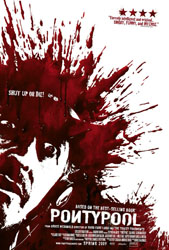
 It's nice to see some fresh blood flow into the old hum-drum school that is the horror movie genre. The dividing lines are strong and the camps are very unsubtly seperated: horror movies are the same old slasher and monster bullshit, by and for the gorehounds, with buckets of blood being dumped all over the usual suspects and thrillers are more psychological in nature, suspense and story-driven, and thoughtful in all the way horror films are not. Rarely do the movies deviate from their paths.
It's nice to see some fresh blood flow into the old hum-drum school that is the horror movie genre. The dividing lines are strong and the camps are very unsubtly seperated: horror movies are the same old slasher and monster bullshit, by and for the gorehounds, with buckets of blood being dumped all over the usual suspects and thrillers are more psychological in nature, suspense and story-driven, and thoughtful in all the way horror films are not. Rarely do the movies deviate from their paths.
Pontypool is high-minded horror as well as a taunt and suspenseful thriller carried by the notions of the horror genre, the all-too-tired zombie film remade into something very subtle and very cerebral.
The setup (and the film itself, for that matter) is very simple: a talk radio DJ, exiled to rural Ontario, comes in on Valentine's Day in the midst of a snowstorm and goes on air only to find that the city around him has descended into chaos as some incomprehensible plague begins to spread offscreen. And this is none of the typical, overused crap that passes for zombie apocalypses. This is a whole new breed; cannibal madmen spouting gibberish, infected by the use of language. Hard to explain and something you should really see to appreciate and understand, particularly without spoiling the fashion in which the film plays out.
This is not to say that the details themselves make up the body of the film. I could explain all the particulars and it still wouldn't ruin the experience of watching this character drama play out in the tight confines of a disused church basement radio station and, particularly, the sound booth at its center, from which our lead, Stephen McHattie, delivers the day's news, weather, sports and other sundry gossip for the small town of Pontypool.
It has been mentioned in interviews that the script-writing and filmmaking of Pontypool have drawn inspiration from the nigh-legendary Orson Welles "War Of The Worlds" radio broadcast and you can feel this throughout the film. Almost all action happens off-screen and most of the experiences of the movie are gathered through listening to people's voices and words, well-chosen for the subject matter. You could close your eyes and just listen to the film and very few events would be lost from your understanding. The first 40 minutes could easily stand as a radio play and the whole movie could be performed on stage, never leaving the confines of the church building/radio station.
Bruce McDonald, an accomplished director best known for Hard Core Logo, keeps the film simple but the look of the movie is elegant and every shot is well-composed, particularly the often eerie cut-aways to still scenes that make you fear some sudden surprise to come. McDonald shepherded along this film, adapted by his friend Tony Burgess from his own novel, Pontypool Changes Everything, and you can feel it in the movie; a labor of love is not often the environment of an ostensible zombie movie, even one raised to the rarified atmosphere of something as intelligent as Pontypool.
Though this minor Canadian film has the cachet and feel of a small independant movie, it manages all the qualities of a well-funded and financed picture from one of the smaller studios that churn out the majority of the yearly horror output in theaters. The cast are top-notch actors; not a rank amateur or friend of the director in the mix to make it feel like a student prodcution. The writing, while possibly slightly obtuse for the casual audience, is smart and keeps you straining to hear the next words, something absolutely necessary in a film that mainly plays out through listening to others' voices. Aside from perhaps a lack of striking eventfulness or shocking revelations in this movie, it is a perfectly made and performed exercise in filmmaking prowess. Anyone with an appreciation for a complex and thrilling work that hinges largely on what is said more than what is shown should be delighted to indulge their mind with Pontypool, which is anything but the norm for horrors or thrillers. And that's a damned good thing.
